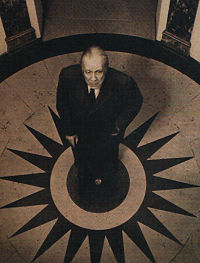I’ve been looking at ubiquitous computing for the past few weeks, working on the first installment of what will be a recurring column in UXMatters, and it’s had me thinking a lot about Borges’ enigmatic Parable of the Palace.

I’m not exactly sure what the resonance is — it literally popped into my head a few weeks ago — but the connection has stuck with me. Maybe it’s the quantum uncertainty of the tale? Or the ambiguity of the symbols. Are designers the poet? It feels that way some days. Is the palace the world around us? Maybe we’re also the emperor…
Without further ado, I present the parable in it’s entirety.
Parable of the Palace
by Jorge Luis Borges
That day the Yellow Emperor showed his palace to the poet. Little by little, step by step, they left behind, in long procession, the first westward-facing terraces which, like the jagged hemicycles of an almost unbounded amphitheater, stepped down into a paradise, a garden whose metal mirrors and intertwined hedges of juniper were a prefiguration of the labyrinth. Cheerfully they lost themselves in it — at first as though condescending to a game, but then not without some uneasiness, because its straight allées suffered from a very gentle but continuous curvature, so the secretly the avenues were circles. Around midnight, observation of the planets and the opportune sacrifice of a tortoise allowed them to escape the bonds of that region that seemed enchanted, though not to free themselves from that sense of being lost that accompanied them to the end. They wandered next through antechambers and courtyards and libraries, and then through a hexagonal room with a water clock, and one morning, from a tower, they made out a man of stone, whom later they lost sight of forever. In canoes hewn from sandalwood, they crossed many gleaming rivers–or perhaps a single river many times. The imperial entourage would pass and people would fall to their knees and bow their heads to the ground, but one day the courtiers came to an island where one man did not do this, for he had never seen the Celestial Son before, and the executioner had to decapitate him.
The eyes of the emperor and poet looked with indifference on black tresses and black dances and golden masks; the real merged and mingled with the dreamed–or the real, rather, was one of the shapes the dream took. It seemed impossible that the earth should be anything but gardens, fountains, architectures, and forms of splendor. Every hundred steps a tower cut the air; to the eye, their color was identical, but the first of them was yellow and the last was scarlet; that was how delicate the gradations were and how long the series.
It was at the foot of the penultimate tower that the poet (who had appeared untouched by the spectacles which all the others had so greatly marveled at) recited the brief composition that we link indissolubly to his name today, the words which, as the most elegant historians never cease repeating, garnered the poet immortality and death. The text has been lost; there are those who believe that it consisted of but a single line; others, of a single word.
What we do know–however incredible it may be–is that within the poem lay the entire enormous palace, whole and to the least detail, with every venerable porcelain it contained and every scene on every porcelain, all the lights and shadows of its twilights, and every forlorn or happy moment of the glorious dynasties of mortals, gods, and dragons that had lived within it through all its endless past.
Everyone fell silent; then the emperor spoke: “You have stolen my palace!” he cried, and the executioner’s iron scythe mowed down the poet’s life.
Others tell the story differently. The world cannot contain two things that are identical; no sooner, they say, had the poet uttered his poem than the palace disappeared, as though in a puff of smoke, wiped from the face of the earth by the final syllable.
Such legends, of course, are simply literary fictions. The poet was the emperor’s slave and died a slave; his composition fell into oblivion because it merited oblivion, and his descendants still seek, though they shall never find, the word for the universe.

